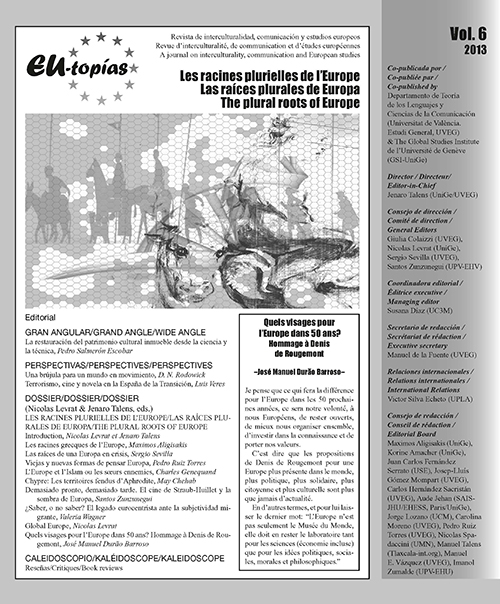Les racines grecques de l'Europe: propos sur la citoyenneté et l'altérité
DOI:
https://doi.org/10.7203/eutopias.0.18882Keywords:
Ancient Greece, Thucydide, Eschyle, citizenship, alterity Abstract
Abstract
The aim of the essay is to study two aspects of Greek heritage in Europe: democratic citizenship and the issue of otherness. Parts of Thucydides’ History of the Peloponnesean War? will be taken into account in order to deal with the former aspect, the latter will accounted for by reference to one of Aeschylus’ works. The overall experience of the Athenian polis should be neither underestimated nor overevalued, which means that Athens’ contribution to active citizenship and deliberative democracy is challenged if one considers the relevance of oligarchic practices in the life of the city. In a similar manner, the primacy of «?the native?» vs the barbarism of the Other is partially questioned by a notable attention to the prosecuted foreigner. Greece’s past is multifacetted and contradictory and it should be analized in a balanced way. It is crucially urgent for Europe to transcend itself while leaving aside the simplistic image of an idealized Greece.
 Downloads
Downloads
 References
References
ALIGISAKIS, Maximos (2012), « Le conflit entre les cultures : moteur de l’histoire ou simple épiphénomène ? ». In Maximos Aligisakis et Sofia Dascalopoulos, dir.,Multiculturalismes et identités en Europe, Louvain-la-Neuve : L’Harmattan-Academia, 2012, pp. 19-37.
AZOULAY, Vincent (2010), Périclès. La démocratie athénienne à l’épreuve du grand homme, Paris : Colin.
BALIBAR, Etienne (2001), Nous, citoyens d’Europe ? Les frontières, l’Etat, le peuple, Paris : La Découverte.
BOBBIO, Norberto (1996), Libéralisme et démocratie, Paris : Cerf.
CANFORA, Luciano (1993), « Le citoyen ». In Jean-Pierre VERNANT, dir., L’homme grec, Paris : Seuil, pp. 145-183.
DETIENNE, Marcel (2009), Comparer l’incomparable, Paris : Seuil.
DETIENNE, Marcel (2010), L’identité européenne, une énigme, Paris : Gallimard.
DEWITTE, Jacques (2008), L’exception européenne : ces mérites qui nous distinguent, Paris : Michalon, 2008.
DIMOU, Nikos (2012), Du malheur d’être grec, Paris : Payot-Rivages.
GIRARD, Charles et LE GOFF, Alice, dir. (2010), La démocratie délibérative. Anthologie des textes fondamentaux, Paris : Hermann Editeurs.
GRODENT, Michel (2000), La Grèce n’existe pas, Mons : Talus d’approche.
HUNYADI, Mark (2011), « L’Europe, foyer de l’universel ? », Revue Philosophique de Louvain, N° 109, pp. 51-72.
JUDET de la COMBE, Pierre (2011), « Warum Greece ? », Labyrinthe, N° 36, pp. 81-88.
MAALOUF, Amin (1998), Les identités meurtrières, Paris : Grasset.
MAGNETTE, Paul (2001), La citoyenneté, Bruxelles : Bruylant.
MOLDE, Klaus (2011), « La philosophie peut-elle (se) comparer ? », Labyrinthe, N° 36, pp. 37-54.
RIMBAUD, Arthur (2004), Œuvres complètes. Correspondance, Paris : R. Laffont / Bouquins.
ROMILLY, Jacqueline de (2001), Pourquoi la Grèce ?, Paris : Librairie Générale Française.
ROUSSEAU, Jean-Jacques (1973), Du contrat social, Paris : Union Générale d’Editions.
SEN, Amartya (2009), La démocratie des autres, Paris : Payot-Rivages.
SINTOMER, Yves, et TALPIN, Julien, dir. (2011), « Démocratie délibérative », Raisons politiques, N° 42.
THUCYDIDE (1964), Histoire de la guerre entre les Péloponnésiens et les Athéniens, Paris : Bibliothèque de la Pléiade – Gallimard (ouvrage introduit par J. de Romilly et présenté par D. Roussel).
TODOROV, Tzvetan (2008), La peur des barbares. Au-delà du choc des civilisations, Paris : Laffont.
TRAGIQUES GRECS (1967), Eschyle-Sophocle, Paris : Bibliothèque de la Pléiade – Gallimard (traduction par J. Grosjean ; introductions et notes par R. Dreyfus).
Downloads
Published
How to Cite
-
Abstract160
-
PDF (Français )46
Issue
Section
License
![]()
The authors conserve the copyright. All content published in EU-topías. Journal of interculturality, Communication, and European Studies are subject to the license Creative Commons Attribution-NonCommercial-ShareAlike 4.0 license. The full text of the license can be found at <http://creativecommons.org/licenses/by-nc-sa/4.0>
They may be copied, used, disseminated, transmitted and publicly displayed, provided that:
- The authorship and original source of the publication is cited (journal, publisher and URL of the work).
- They are not used for commercial purposes.
- The existence and specifications of this license of use are mentioned.
It is the responsibility of the authors to obtain the necessary permissions for images that are subject to copyright.



